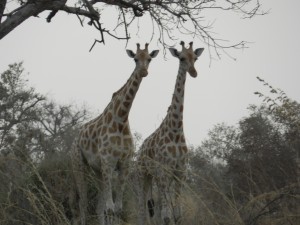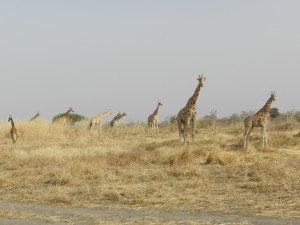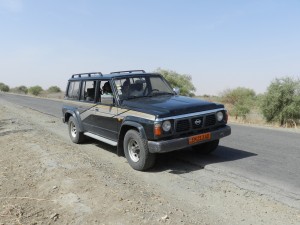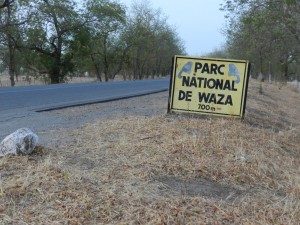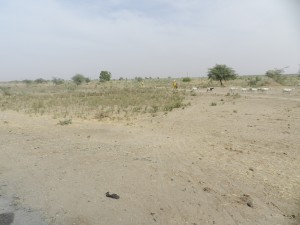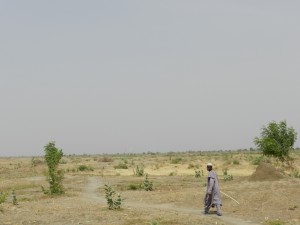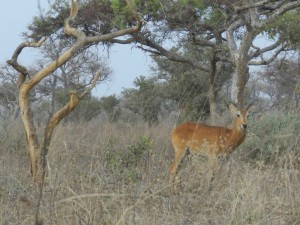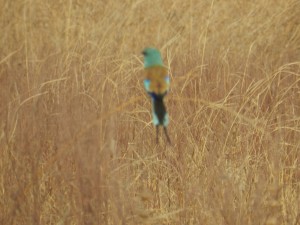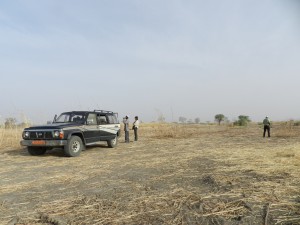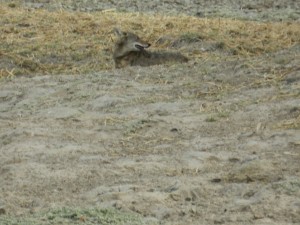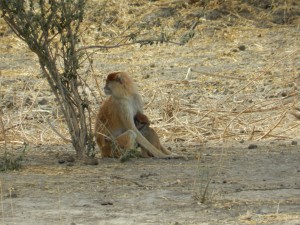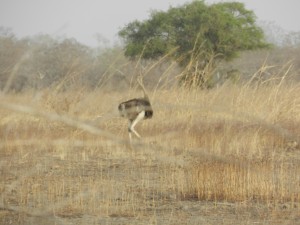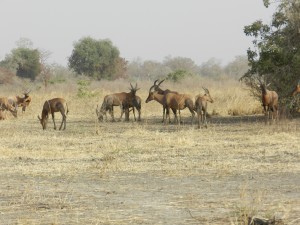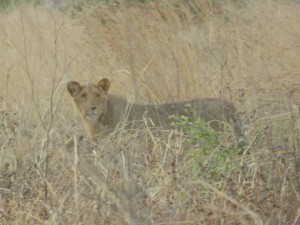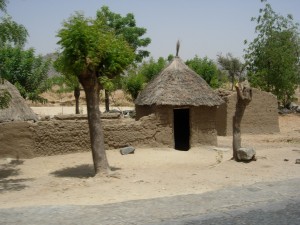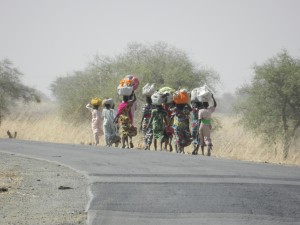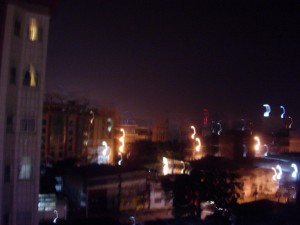
Douala at night
Since our taxi driver, Maurice, spoke nary a lick of English, and since neither my wife nor I understand any French more complicated than laissez les bon temps roulez, the look on our chauffeur’s mug was likely the response to nothing more than fundamental intra-language cross-circuiting. By utilizing a combination of hand gestures, crude drawings and that time-tested method for breaching cultural abysses: talking louder and louder, Maurice seemed to grok items 1-3 on our first-full-day-in-Africa checklist: I needed to procure a pocketknife, mine having been a victim of incomprehensible carry-on-luggage prohibitions. We needed a spare charger for our Nikon camera batteries, one we knew for sure would work with whatever static shit it is that spews forth from local sockets in unpredictable fashion. We needed to convert U.S. dollars into whatever shit it is they use for money hereabouts. And we, having a full day to kill before we fly to the northern part of the country in hopes of viewing lions, tigers and bears in their native habitat, would like to take a three-hour tour of Douala, Cameroon’s largest city, to orient ourselves, to eyeball the local sights, to kill some time before the inevitable first-full-day-in-Africa drinking marathon commences.
Maurice required clarification of list item #4. We pulled out the manager of the restaurant of the fortress-like Hotel Bano Palace (it did not escape our notice that the second word of our hotel’s name was one tilde short of translating to “bathroom” in Español), where we were ensconced. The manager is a native of Equatorial Guinea, the only Spanish-speaking country in Africa. So, I spoke to him in Tex-Mex and he translated my requests to Maurice in French. Maurice’s befuddled expression did not de-fuddle. He responded in French to the restaurant manager, who passed along that translation to me in Spanish tinged mightily with an accent that verily dripped tropical mildew.
“He wants to know what you would like to see specifically?” was the gist of this multi-pronged attack on fundamental linguistics.
“The sights! We’re tourists … we have never been here before … we will never be here again … so we would like to check out Douala.” It was about 400 degrees with a 500-percent humidity. My jet-lagged ass was starting to get exasperated. Back and forth this went for a few more centuries before, finally, Maurice nodded his head, his visage betraying the fact the he was still a bit baffled, and away we drove into the bustling madness of downtown Douala. We were perplexed by Maurice’s perplexedness. He was, after all, a taxi driver who stationed himself right in front of one of Douala’s top-shelf (all things being relative) lodging facilities. Surely, we could not have been the only foreigners to have requested a tour of his home city.
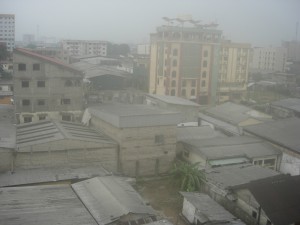
Misty-morning view from the Hotel Bano Palace.
The Hotel Bano Palace is located on a less-than-totally chaotic side street. Where we needed to go to score a pocketknife, a battery charger and a wad of whatever shit is it is they use for money hereabouts (turns out it’s CFA (pronounced CEE-fah) — Central African francs, a pretty much non-convertible currency shared by numerous nations in this part of the Dark Continent) was the center of a city described by travelers as one of the biggest urban cesspools on a continent that sports more than its fair share of urban cesspools. By the time we turned onto the main drag, Boulevard de la Liberte, that cesspooliness exploded into our reality in such a way to make one thankful for the plethora of synonyms our language boasts for “bedlam.” Disarray. Mayhem. Pandemonium. Havoc. Turmoil. Anarchy. Every subtle nuance of that synonymic symphony manifested itself by way of inadequate, disrepaired streets filled to over-brimming with every variation imaginable on the exhaust-spewing internal-combustion-engine theme (and here we come to praise yet another English-language cavalcade of synonyms) — antiquated cars, venerable trucks, decrepit motorcycles, doddering buses, ancient tractors, hell, even the occasional infirmed, wheezing riding lawnmower — along with aged bicycles by the millions and colorfully clad pedestrians by the zillions, all moving about in willy-nilly fashion following, as far as we could tell, not a single traffic law, assuming there were any local traffic laws, which is doubtful in the extreme. The only unifying component to the chaos bedlam disarray mayhem pandemonium havoc was the constant application of horns, which were applied by every single vehicle crammed onto the streets (and, often, sidewalks) every single second.
It was an amusingly captivating scene and one that presented very little in the way of actual physical threat, because, since the streets and sidewalks were so crammed full of vehicles, people and vendors purveying everything from household appliances to formal attire to homemade bush remedies concocted from unidentifiable viscera, nothing could move at more than about point-two miles per hour. And, since we weren’t driving, we were able to dispassionately spectate the chaos bedlam disarray mayhem pandemonium havoc from the relative, albeit hot-and-humid, comfort of Maurice’s dilapidated taxi.
I was especially transfixed by the traffic-merging protocols, all of which were beyond my comprehension. Since every traffic light I saw in this city of three million inhabitants did not function, intersections were seemingly anarchic. And they were defined by what looked to be the most laid-back form of machismo I had ever seen. As this sea of antiquated cars, venerable trucks, decrepit motorcycles, doddering buses, ancient tractors and the occasional infirmed riding lawnmower approached intersections, they all accelerated slightly and blared their horns even more. Fists were shaken and invectives hurled. Were such a scene to manifest itself in the U.S., bumper-car-like collisions would become so prevalent that tire-track-adorned corpses would have been piled high in the median strips. Fistfights would erupt en masse. Every car insurance company in the nation would soon have to declare bankruptcy. Yet, here in downtown Douala, stunningly, inexplicably, a sense of propriety and order manifest itself in such a way that we witnessed not so much as a mild fender-bender, and it soon became apparent that all the machismo was ornamental. By the time the miraculous merging took place, every driver seemed relaxed and courteous. They were all marching to a beat we could not discern.
Maurice managed, via stopping and asking vendors attending to sidewalk-based kiosks that all seemed to specialize in one item and one item only — laundry detergent, razor blades, fans, white faux leather belts, flip-flops, a veritable Walmart’s worth of goods spread across the cityscape — who knew another vendor three blocks down who might know another vendor seven blocks the other direction, to locate both a pocketknife and a battery charger for our camera.
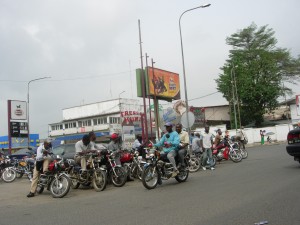
Across from the black-market exchange corner.
Then he took us to what apparently is Douala’s Wall Street of black-market currency exchange: a street corner populated by several hundred very large black (I almost said Africa-American) guys who would have been intimidating in a cellblock-C sorta way, except for the fact that every one of them sat astride motorcycles so diminutive that Shriners would have been mortified ride them in a small-town Fourth of July parade.
Maurice beckoned a gentleman who looked to have been recently released by the Detroit Lions because he was too ugly and mean-looking and had too many scars on his face. They chatted conspiratorially for a few moments, then the man joined us in the taxi. I have traded dollars for whatever shit it is they use for money in many unsavory venues during my Third-World travels. I have traded yuan for FEC in a dimly lit alleyway in rural China where Round Eyes had never before been seen and where scores of opium-smoking Mao clones eyed me in a way I could not even come close to reading. I have traded lempira for colones with child soldiers as the sounds of contra machine gun fire resonated throughout the surrounding jungle. I have traded sols for bolivianos in Cuzco with the tattered remnants of the sendero luminoso. And here I was, yet again, subscribing to the operational philosophy that, the better the black-market exchange rate, the worse the surrounding circumstances. When you exchange money for a bad rate at a bank or hotel in the Third World, you are paying for comfort, safety and predictability, for air conditioning, armed guards and a sense of assurance that you will indeed receive the amount of money you are promised without getting robbed, raped, stabbed and killed. To get the best rates, however, you must venture forth into the great fearsome unknown. Despite the aforementioned diminutive motorcycle situation, and despite my previous experience with sordid black-market scenarios, I have never been on black-market red alert to the degree that I was there on that corner of Boulevard de la Liberte in Douala, Cameroon. I started preemptively running my fingers across my recently procured pocketknife.
There is little doubt that the racial make-up of, well, every other human being within about 2,000 miles of our current location, had a lot to do with the intimidation factor. In the U.S., we are culturally indoctrinated to consider every black neighborhood — especially those that would be classified as “slums” (which, I think it’s fair to say that downtown Douala would be thus classified) — to be off-limits danger zones for those of us who sport obvious northern European pigmentation.
I pulled out a big wad of dollars — which amounted to several year’s worth of wages for the average Cameroonian — and handed it over to the huge, scar-faced black guy sitting in the back seat of the taxi next to my wife. Every eye in the vicinity was focused upon us. Scarface took that wad over to yet another huge black man whose face was also adorned with scars. Upon further examination, I could not help but notice that pretty much every one of the huge black men sitting astride their 75cc mopeds was thus scarred. Probably a result of some sort of tribal coming-of-age ceremony, although there was a distinct possibility those scars bore graphic testimony to the number of dumbass white people looking to buy CFA that the scar-bearer has dispatched during his life. Those scars definitely got me thinking that, if these people are willing to maim themselves for whatever reasons, what would they be willing to do to us for a couple thousand dollars?
Ahem.
Our friend soon returned with a wad of CFA the size of a pillow. He meticulously counted the filthy bills and handed them to me to count. It was all very professional and courteous and, within minutes, we were on our thankfully unscathed way.
It dawned on me later that, though I’m certain the money-changing transaction would have taken place without incident no matter the circumstances (an observation proved correct over the course of the next three weeks), there’s little doubt that Maurice considered us to be his charges and under his protection and that he wouldn’t have taken us to a place where our safety was in jeopardy. This is a lesson that people who have traveled to Third-World cesspools know well: Hook up with someone whose very honor hangs upon your comfort and safety.
At that point, it was time for item #4 on our checklist: The tour of Douala. Maurice had upon his dashboard a tattered paperback copy of a third-grade-level French/English dictionary. This served as our Rosetta Stone as we made our slow way along Douala’s crowded byways. Maurice, like many Cameroonians we met, had but one major life goal: To move to America, where he was certain his taxi-driving expertise would be much in demand. To that end, he was extremely interested in any help I might lay on him in his earnest quest to master our lingo. Several times, as a matter of no small interest, he pulled out his pocket notebook and a pen to jot down whatever nuggets of vocabulary-and-grammar-based wisdom I might lay of him. I should point out that at no time did Maurice feel compelled to pull over, or to even slow down, as he was jotting down my contributions to his education, most of which consisted of such useful phrases as “WATCH OUT!!!” and “FUCK!!! YOU JUST RAN OVER AN OLD LADY!!!” (This is a somewhat primitive example of why people ought not combine texting and driving.)
Here would be a good time to point out that I am in no way, shape or form a city person. It would bother me not one whit if I never ever stepped foot again in an urban area. I hate traffic, I hate congestion, I hate sprawl, befouled air, noise, the whole over-populated enchilada. But, like most folks with a propensity to travel internationally, I realize that city/Fayhee interface is oft times unavoidable. So, you might as well make the best of it, and the way to make the best of those unavoidable interfaces with cities is to take advantage of the types of offerings generally found only in cities: museums, art galleries, well-coiffed parks, symphony orchestras and ballet. And doing so does not always suck, though I have — and my wife understands this about me — pretty much a two-cultural-activity-per-day-limit. I can handle one art gallery and one museum, or two museums and two art galleries. Then that’s it. Then it’s time to find a bar and start drinking. As long as we do not exceed that writ-in-stone limit, I can generally not only handle a day or two dealing with an urban environment, but I can usually have a good time. I have lived in two cities: Chicago and Denver, and I’d like to think I took advantage, in a “well, since I’m here … ” kind of way, of the cultural offerings. I have been to the Chicago Art Institute. And whatever museum it is in the Mile High City that had all the old Egypt shit that one time.
During our various travels, I’ve voluntarily signed on for some very rewarding cultural experiences while in urban environments. When we were in Paris, we went to the Louvre and the Picasso Museum. When we were in Rio, we went to the Botanical Gardens and the National Museum to check out an ancient map exhibit. I’ve been to the Smithsonian. All pretty cool shit, but, when you get right down to it, I’m tapping my foot and eyeballing my watch and counting the minutes before we can get out of town and back into more backcountry, or, failing that, more rural, settings.
There was no avoiding the fact that we had a full day to kill in Douala, so we might as well make the best of it. I thumbed through Maurice’s third-grade-level French/English dictionary and pointed to musee. Maurice took his eyes off the road yet again, ran over yet another old lady and shook his head. OK, no museum in the entirety of Douala. I then pointed to parc. Again, he shook his head. OK, not even a goddamned park. Let’s try monument. None. What do you fucking mean, there’s not even a fucking monument in this cesspool of a city? I had never been to any city that does not at least boast some over-the-top sculptural ode to some horrible despot or to a horse-mounted general who never in his life won a battle and whose only military claim to fame is that he violently repressed his own people.
Archeologique?
Non.
Jardin zoologique?
Non.
What then?
Rien.
Nothing.
So Maurice just drove us through his city of nothing. He drove us by the city’s industrial manufacturing area, which was one of the most-dismal places I had ever seen. I mean, this was the kind of place that would convince anyone subscribing to the notion of karma to mend his or her ways pronto lest he or she get resurrected here. It was the lunch hour, and hundreds and hundreds of filthy, rag-wearing workers were sitting on the sides of potholed streets eating bowls of god-knows-what next to outdoor food stalls that did not look as though they would pass a health department inspection in a sewage treatment plant in the Mississippi Delta. We saw no smiles at all, only grim grimaces as these workers eyeballed us with disdain as we passed far too slowly for my taste.
Then Maurice drove us to the harbor area, Douala being Cameroon’s largest port city. We had visions of maybe sipping a beer or two on some terrace above a tropical beach. The harbor area was even more-grim than the industrial area. The closest thing to a terrace on the beach were barely standing shacks populated by some of the most-hopeless-looking human beings I have ever laid eyes on. The stench was overwhelming.
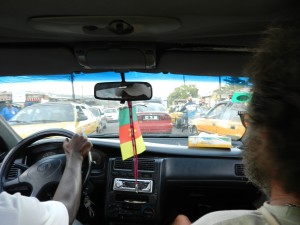
A relaxing taxi ride through the cesspool.
And here I guess I need to point out two things. First, I have visited some shitholes in my travels. Places where dirty-faced, naked toddlers with bloated bellies sit staring listlessly into the distance while flies gather around their eyes. In other words, it’s not like all my travels have been to Newport, Rhode Island, and Hampton Court. I have seen some funky shit. But, man, the harbor area of Douala was a horse of a whole nuther dispirited color.
Second, I need to stress that the blatant dispiritedness we witnessed in the industrial and harbor areas of Douala were not indicative of the rest of Cameroon, where, by and large, the people seemed lively and happy.
Maurice asked if we wanted to stop for a beer at the harbor. I told him I was not right then thirsty, but thanks for the thought.
Then he took us to what might, in some far-reaching stretch of relativity, be considered a borderline tourist destination: Douala’s crafts market. Ours was the only car in a parking lot adjacent to what looked to be the kind of worn wooden building where one would expect to enjoy a cock-fighting spectacle. The dimly lit interior was yet another petri dish of synonyms. Airless. Stuffy. Stifling. Sultry. Oppressive.
It was apparent that we were the only potential customers to have arrived in this facility for eons. Maybe forever. The market consisted on extremely small corridors that were lined with small rooms, each being its own separate business with its own proprietors who sat desultorily nearby. These various shops contained everything from paintings to wood carvings to jewelry to musical instruments. Pretty much what you would expect from a crafts market. Thing is, first, it was almost impossible to actually see what each of these unlighted cubicles offered. Second, the heat and humidity were so oppressive that, within minutes of entering, it was our sole objective in life to egress the premises at a full gallop. Third, the method by which the shop owners, all of whom were like six-eight, attempted to entice us into their diminutive boutiques was disconcerting in the extreme: They would rise from their positions of repose (seemingly, for the first time in their lives), then stand in front of the entryways of their stifling, lightless rooms, blocking the way, then, with a raised arm, pointing toward their wares while sporting scowls that indicated potential violence should we opt to pass by without making a purchase. Or at least that’s what those facial expressions would have looked like had any of these business owners seemed like they actually gave a flying fuck. They, like us, were obviously too hot and sweaty to care.
And, since there were at least 200 of these shops and shop owners lining the maze-like corridors of the crafts market, it took us a sold year before Maurice led us finally out into the open air. I thought Gay was going to expire on the spot. Under every other circumstance I can think of, being outside in the middle of the day in Douala — located at 4 degrees north latitude — is scorching and muggy. After leaving the claustrophobic confines of the crafts market, it seemed as though we had just stepped onto a glacier in Greenland. Which is a shame, because, with a little air conditioning, or hell, even with a little airflow, we would have been interested in doing a little gift shopping. As it was, all we could do was gasp for air.
Maurice opted to end our tour with a drive by Douala’s most-upscale neighborhood. Though the capital of Cameroon is Yaounde, five hours away by road, Douala is the economic hub of the country. Consequently, it is home to many foreign bigwigs who, it’s my guess, got sent here not because of the economic opportunity, but, rather, because they had committed some sort of corporate faux pas, like maybe sleeping with the boss’ daughter, and this was their punishment. Douala’s affluent neighborhoods were actually decent enough. The streets were a bit tidier and more orderly. The vendors lining the sidewalks had noticeably fewer scars on their faces. There was less traffic and noise. And each and every house was surrounded by a fence taller and more fortified than the U.S./Mexico border fence. There was razor wire and video surveillance cameras and armed guards who squinted threateningly as we passed.
Maurice was beaming. He was obviously very proud of this, the nicest part of the city where he was born and raised.
At the Hotel Bano Palace, there was a very interesting group of guests. They were from all over the world — Canada, Scotland, Spain, the Philippines — and they worked for a company that serviced marine oilrigs. They worked on a boat that dropped deep-sea divers over the side, and those divers would be lowered into the depths to repair the underwater parts of the rigs. These folks were currently in bureaucratic limbo. They were scheduled to go to work in neighboring Nigeria, but their visa situation was somehow fucked up. They were waiting for their company to sort the mess out (a process, I should point out, that took more than two weeks). Because they had been issued transit visas for Cameroon, they were essentially imprisoned in the Hotel Bano Palace; they were only allowed to travel between the hotel and the airport. Were any of them caught wandering around Douala, they would have been arrested and taken to a Cameroonian jail, which I’m certain would have been very pleasant.
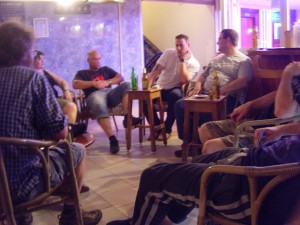 We drank beaucoup beverages with these folks, who assumed we, like them, were in Douala for work-related reasons. When we told them we were on vacation, every proximate jaw dropped. “On holiday here?!?!?” was the unified response. We explained that, no, we were in Cameroon mainly to visit the game parks up north, that our short time in Douala was due to waiting for a connecting flight to the sub-Sahara. This did little to assuage their incredulous curiosity, as we came to learn that none of them, ever, in all their years of working on marine oilrigs in exotic, off-the-map countries I would love to visit, had ever done anything save go to the rig, work, go home. None had ever ventured forth into the places they worked. They were shocked to learn that Cameroon was home to some of the best national parks in West Africa.
We drank beaucoup beverages with these folks, who assumed we, like them, were in Douala for work-related reasons. When we told them we were on vacation, every proximate jaw dropped. “On holiday here?!?!?” was the unified response. We explained that, no, we were in Cameroon mainly to visit the game parks up north, that our short time in Douala was due to waiting for a connecting flight to the sub-Sahara. This did little to assuage their incredulous curiosity, as we came to learn that none of them, ever, in all their years of working on marine oilrigs in exotic, off-the-map countries I would love to visit, had ever done anything save go to the rig, work, go home. None had ever ventured forth into the places they worked. They were shocked to learn that Cameroon was home to some of the best national parks in West Africa.
“When I vacation, I take my family to Disneyland,” one Scot said, almost dismissively.
But, then again, their stories about their work life perhaps put their detachment into context. When they fly into Nigeria, for instance, they do so on a chartered plane in the bright light of midday, so they have plenty of time before darkness falls to get to the harbor. They are escorted every inch of the way by armed guards and travel only in a military convoy. The boat from which they work, even when it is out at sea, is protected 24/7 by scores of naval vessels. The threat of piracy, kidnapping and execution is very real. Were I to work under those circumstances, perhaps I would be inclined to visit Disneyland while on vacation as well.
And here would be the prefect time for some profundity about the yin-yang nature of travel, something about how superficial travel can be and often is when all you do is hit the cool shit, the museums and game parks and oceanfront terraces. I have no such profundity here. I am sure there are people who, when they hit the road, eschew all tourist spots, who concentrate solely on the Doualas of the world and who maybe find so much beauty that they write poems and songs about life in the chaos bedlam disarray mayhem pandemonium havoc. I am not such a person. Places like Douala, for me, exist most comfortably in the past participle. I am glad to have visited them. Then I am happy to move on the greener pastures. Though travel, at least intense travel, is a series of individual experiences layered atop one another like a veneer, eventually, it becomes a composite, where those individual experiences melt into one another in such a way that they become “the trip” or “the journey” that we took to Cameroon. Without Douala, our trip would have been something entirely different. It is impossible to say in what way.
We bought Maurice a beer, thanked him profusely for the tour — which seemed to make him happy — tipped him well and told him that, next time we happen to be in the neighborhood, we’ll be sure to look him up. Then we retreated to our fortress-cum-hotel and wiled away the rest of the day, sipping ice-cold beverages next to a rooftop pool with a slew of oilrig workers who were perfectly content to recline in comfort until the moment when they had to enter what to them is a very real world.
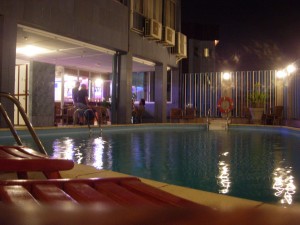
The rooftop pool at the Hotel Bano Palace.
